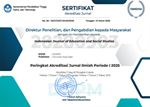Absari, N., Priyanto, P., & Muslikhin, M. (2020). The Effectiveness of Technology, Pedagogy and Content Knowledge (TPACK) in Learning. Jurnal Pendidikan Teknologi Dan Kejuruan, 26(1), 43-51. https://doi.org/10.21831/jptk.v26i1.24012
Afandi, S. H. (2024). Peningkatan Kualitas Pembelajaran Melalui Kompetensi Literasi Digital Dan Continuing Professional Development (Cpd)(Analisis Sequential Explanatory Pada Guru Mts. Negeri 5 Tangerang) (Doctoral dissertation, Institut PTIQ Jakarta).
Arbi, Z. F., & Amrullah, A. (2024). Transformasi sosial dalam pendidikan karakter di era digital: Peluang dan tantangan. Social Studies in Education, 2(2), 191-206.
Asipi, L. S., Rosalina, U., & Nopiyadi, D. (2022). The Analysis of Reading Habits Using Miles and Huberman Interactive Model to Empower Students' Literacy at IPB Cirebon. International Journal of Education and Humanities, 2(3), 117-125. https://doi.org/10.58557/ijeh.v2i3.98
Afzal, Gul, M. S. (2024). The Role of Parental Digital Literacy in Supporting Online Learning Among Early Grade Students. 02(04), 109-116.
Benoliel, P., & Schechter, C. (2023). Smart collaborative ecosystem: leading complex school systems. Journal of Educational Administration, 61(3), 239-255. https://doi.org/10.1108/JEA-09-2022-0146
Burhan Nudin, Lukman, Wahyu Sihab, Nofri Aldinata, Muhammad Daffa Imaduddin, & Triono. (2024). The Role Of Parents And Families In Children's Education In The Digital Era. Linguanusa : Social Humanities, Education and Linguistic, 2(1), 9-22. https://doi.org/10.63605/ln.v2i1.35
Cahyono, A. E., Herawati, Y. W., & Al Anshory, A. M. (2022). Online teaching by digital native and digital immigrant lecturers of higher education. International Journal of Innovative Technologies in Social Science, 4(36), 1-14.
Deysolong, J. A. (2023). the Crucial Role of Parent Involvement in the Learning Process of Students. Article in International Journal of Value-Based Management, May, 1-4. https://doi.org/10.6084/m9.figshare.22999787
Ellen Johanna Helsper, and D. S. (n.d.). Excessive Internet Use: Psychological Vulnerability and Digital Literacy 1. Psychological Vulnerability and Digital Literacy, 1-37.
Hartantio, F. W., Prabantoro, B. T. R., & Wijono, S. (2023). The Correlation Between Low Birth Weight and Stunting In 2-5 Years Old Children. Journal Of Widya Medika Junior, 5(1), 38-43. https://doi.org/10.58439/jhrt.v2i2.243
Hasanah, S. M. R., & Supriyanto, A. S. (2023). Strategi inovasi kepala madrasah dalam membangun smart learning ecosystem di Ma Al Irtiqo'IIBS Malang. Evaluasi: Jurnal Manajemen Pendidikan Islam, 7(2), 135-148. https://doi.org/10.32478/evaluasi.v7i2.1478
Koul, S., & Nayar, B. (2021). The holistic learning educational ecosystem: A classroom 4.0 perspective. Higher Education Quarterly, 75(1), 98-112. https://doi.org/10.1111/hequ.12271
Kundu, A., & Bej, T. (2021). We have efficacy but lack infrastructure: teachers' views on online teaching learning during COVID-19. Quality Assurance in Education, 29(4), 344-372. https://doi.org/10.1108/QAE-05-2020-0058
Munna, M. S. H., & Hossain, M. R. (2024). Digital Education Revolution: Evaluating LMS-based Learning and Traditional Approaches. Journal of Innovative Technology Convergence, 6(2), 21-40. https://doi.org/10.69478/jitc2024v6n002a03
Nasir, M., Mahmudinata, A. A., Ulya, M., & Firdaus, F. A. (2023). Strategi pemberdayaan sekolah sebagai upaya peningkatan manajemen pendidikan. Journal of International Multidisciplinary Research, 1(2).
Safta-Zecheria, L., Ștefănigă, S.-A., Negru, I.-A., & Virag, F.-H. (2020). Challenges experienced by teachers regarding access to digital instruments, resources, and competences in adapting the educational process to physical distancing measures at the onset of the COVID-19 pandemic in Romania. Journal of Educational Sciences, 42(2), 69-86. https://doi.org/10.35923/jes.2020.2.05
Sepúlveda, A. (2020). The digital transformation of education: connecting schools, empowering learners. TIC EDUCAÇÃO, 249.
Shatunova, O. V., Bozhkova, G. N., Tarman, B., & Shastina, E. M. (2021). Education in the Context of Digitalization and Culture: Evolution of the Teacher's Role, Pre-pandemic Overview. Journal of Ethnic and Cultural Studies, 8(3), 62-73. https://doi.org/10.29333/ejecs/347
Shurygin, V., Saenko, N., Zekiy, A., Klochko, E., & Kulapov, M. (2021). Learning Management Systems in Academic and Corporate Distance Education. International Journal of Emerging Technologies in Learning, 16(11), 121-139. https://doi.org/10.3991/ijet.v16i11.20701
Sugitanata, A. (2023). Analisis ekologi sistem Bronfenbrenner terhadap upaya perlindungan anak dari bahaya pornografi di era globalisasi digital. SPECTRUM: Journal of Gender and Children Studies, 3(2), 129-138. https://doi.org/10.30984/spectrum.v3i2.778
Sukisno, Waston, Nirwana, A., Mahmudulhassan, & Muthoifin. (2024). Parenting problems in the digital age and their solution development in the frame of value education. Multidisciplinary Reviews, 7(8). https://doi.org/10.31893/multirev.2024163
Wang, H., Geng, J., Liu, K., Wei, X., Wang, J., & Lei, L. (2022). Future Time Perspective and Self-Control Mediate the Links between Parental Autonomy Support and Adolescents' Digital Citizenship Behavior. Youth and Society, 54(6), 1077-1096. https://doi.org/10.1177/0044118X211020778
Yu, Z. (2022). Sustaining Student Roles, Digital Literacy, Learning Achievements, and Motivation in Online Learning Environments during the COVID-19 Pandemic. Sustainability (Switzerland), 14(8). https://doi.org/10.3390/su14084388
Zuhri, S., Suwindia, I. G., & Winangun, I. M. A. (2024). Literasi digital dan kecakapan abad ke-21: analisis komprehensif dari literatur terkini. Education and Social Sciences Review, 5(2), 149-155. https://doi.org/10.29210/07essr500300
 (Sekolah Tinggi Ilmu Tarbiyah Darul Ulum Kotabaru)
(Sekolah Tinggi Ilmu Tarbiyah Darul Ulum Kotabaru) 



